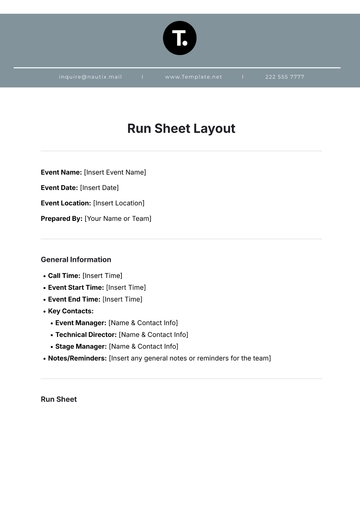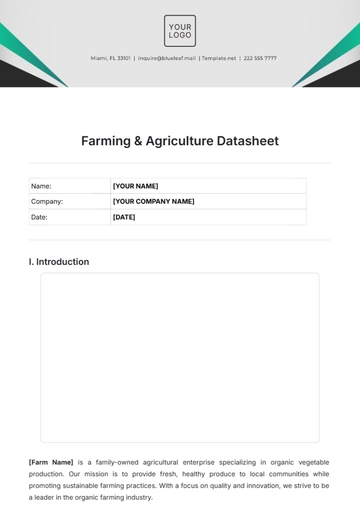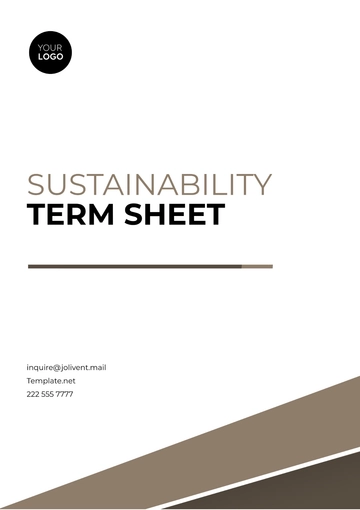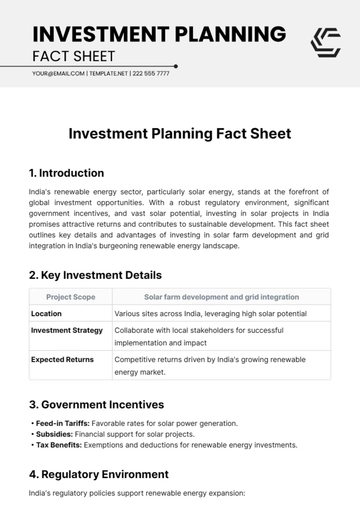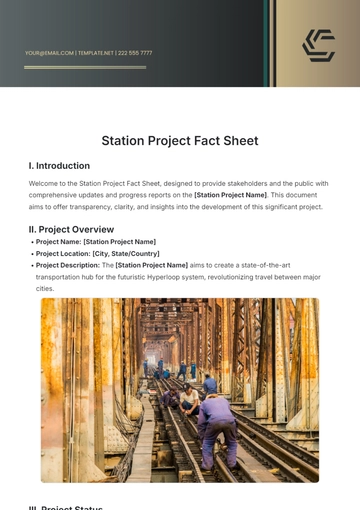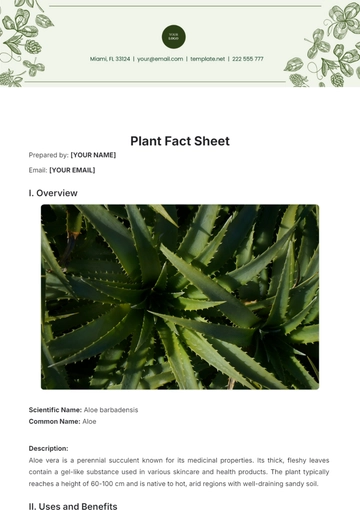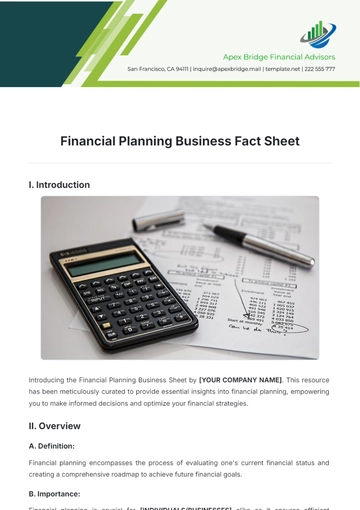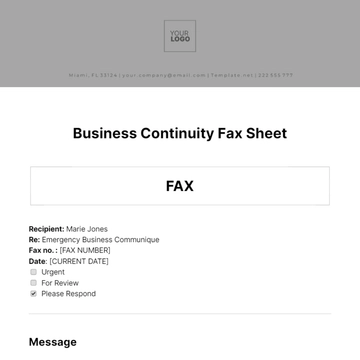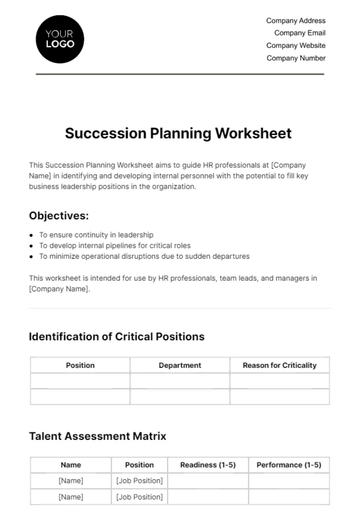Free Farming & Agriculture Datasheet
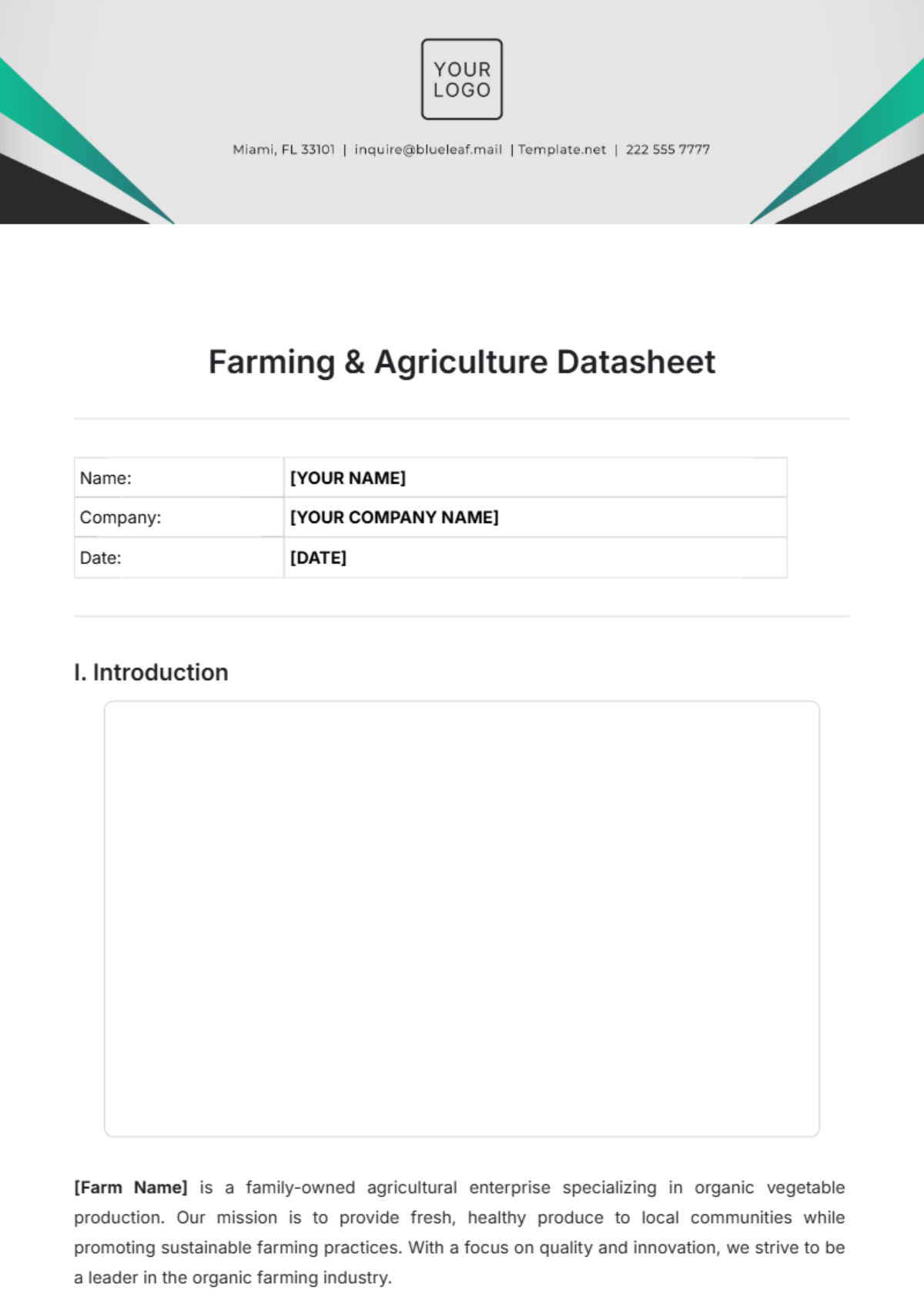
Name: | [YOUR NAME] |
Company: | [YOUR COMPANY NAME] |
Date: | [DATE] |
I. Introduction

[Farm Name] is a family-owned agricultural enterprise specializing in organic vegetable production. Our mission is to provide fresh, healthy produce to local communities while promoting sustainable farming practices. With a focus on quality and innovation, we strive to be a leader in the organic farming industry.
II. General Information
This section captures essential details about farming and agricultural operations. Fill in all the mandatory fields below to provide a comprehensive overview of your farm setup and management practices.
Farm Name | [Farm Name] |
Farm Location | [Farm Location] |
Owner's Name | [Owner's Name] |
Phone Number | [Phone Number] |
Ensure that all terminologies are consistent and accurate to maintain clarity and precision in the data.
III. Crop Information
This section provides detailed information about the crops being cultivated. This includes the types of crops, specific varieties, planting dates, expected yield, and actual yield. Use this data to monitor crop performance and plan future crop cycles effectively.
Crop Type | Variety | Planting Date | Expected Yield (kg) | Actual Yield (kg) |
|---|---|---|---|---|
Wheat | Red Winter | 2060-04-15 | 1000 | 950 |
Corn | Yellow Dent | 2060-05-01 | 1500 | 1450 |
Soybeans | Williams 82 | 2060-06-10 | 1200 | 1150 |
Maintaining detailed crop data helps in understanding seasonal patterns, managing resources more efficiently, and making informed decisions regarding crop rotations and soil health maintenance.
IV. Livestock Information
This section encompasses data regarding the livestock being cared for on the farm. Include types of livestock, their numbers, health status, and any other relevant information such as vaccination schedules and breeding records.
Type of Livestock | Number of Animals | Health Status | Vaccination Schedule | Breeding Records |
|---|---|---|---|---|
Cattle | 50 | Good | Annual vaccinations | Detailed breeding logs |
Sheep | 100 | Fair | Bi-annual vaccinations | Breeding history |
Poultry | 500 | Excellent | Quarterly vaccinations | Egg production records |
Keeping detailed livestock information aids in managing animal health, optimizing breeding strategies, and ensuring that all livestock have the necessary resources and healthcare to maximize productivity.
V. Equipment Information
This section includes a detailed inventory of all farming equipment. Record the type of equipment, purchase date, condition, and any maintenance schedules. Keeping track of equipment ensures that all machinery is well-maintained and available when needed.
Equipment Type | Purchase Date | Condition | Maintenance Schedule |
|---|---|---|---|
Tractor | 2050-05-10 | Good | Monthly check-ups |
Plow | 2051-02-15 | Fair | Bi-annual maintenance |
Seeder | 2052-10-20 | Excellent | Annual servicing |
Harvester | 2053-07-05 | Good | Quarterly maintenance |
Irrigation Pump | 2054-01-12 | Excellent | Seasonal check-ups |
Regular updates to the equipment inventory help in planning capital expenditures, scheduling timely maintenance, and avoiding equipment downtime which could impact farm productivity.
VI. Financial Information
This section captures the financial aspects of farming operations: record revenue, expenses, and profit margins in this section. Detailed financial tracking helps in budgeting, financial planning, and identifying areas for cost reduction or investment.
Financial Aspect | Amount (in currency) |
|---|---|
Total Revenue | $100,000 |
Total Expenses | $70,000 |
Profit Margin | 30% |
Effective financial management is crucial for sustaining agricultural operations, enabling expansion plans, and ensuring overall profitability in the long term.
VII. Compliance and Certifications
Our farm has been Certified Organic by the XYZ Certification Agency since [YEAR], guaranteeing adherence to strict organic standards. We comply with local environmental regulations on pesticide use and waste management, emphasizing sustainable practices. Regular audits ensure food safety compliance and maintain product quality. We engage in ongoing training for sustainable farming and animal welfare, demonstrating our commitment to responsible agriculture.
VIII. Notes and Additional Information
Implemented a new drip irrigation system to improve water efficiency.
Noticed increased pest activity in orchards, implementing organic pest control measures.
Livestock health improved after adjusting feed ratios based on nutritional analysis.
Experimenting with new cover crop mix to improve soil health and reduce erosion.
Planning expansion of greenhouse operations for year-round vegetable production.
- 100% Customizable, free editor
- Access 1 Million+ Templates, photo’s & graphics
- Download or share as a template
- Click and replace photos, graphics, text, backgrounds
- Resize, crop, AI write & more
- Access advanced editor
Optimize your agricultural operations with Template.net's Farming & Agriculture Datasheet Template. This fully customizable and editable template streamlines data management, improving efficiency. Editable in our AI Editor Tool, it allows you to tailor every detail to your specific needs, ensuring your data is always organized and accessible for effective farm management and decision-making.
You may also like
- Attendance Sheet
- Work Sheet
- Sheet Cost
- Expense Sheet
- Tracker Sheet
- Student Sheet
- Tracking Sheet
- Blank Sheet
- Information Sheet
- Sales Sheet
- Record Sheet
- Price Sheet
- Plan Sheet
- Score Sheet
- Estimate Sheet
- Evaluation Sheet
- Checklist Sheet
- Bid Sheet
- Call Log Sheet
- Bill Sheet
- Assessment Sheet
- Task Sheet
- School Sheet
- Work From Home Sheet
- Summary Sheet
- Construction Sheet
- Cover Sheet
- Debt Spreadsheet
- Debt Sheet
- Client Information Sheet
- University Sheet
- Freelancer Sheet
- Bookkeeping Sheet
- Itinerary Spreadsheet
- Scorecard Sheet
- Run Sheet
- Monthly Timesheet
- Event Sheet
- Advertising Agency Sheet
- Missing Numbers Worksheet
- Training Sheet
- Production Sheet
- Mortgage Sheet
- Answer Sheet
- Excel Sheet
